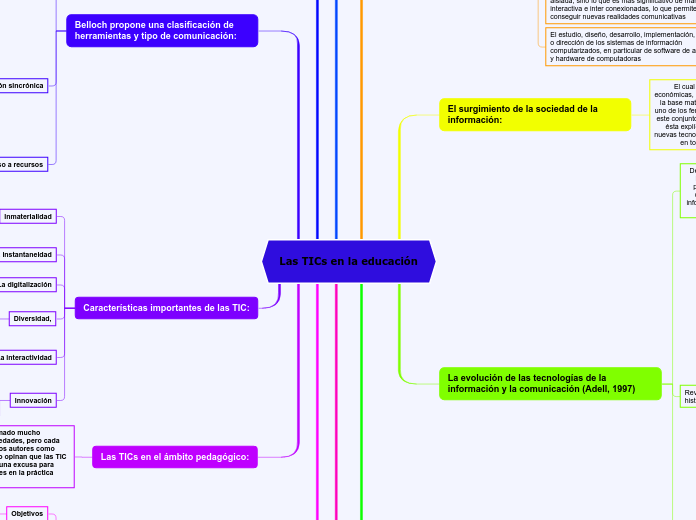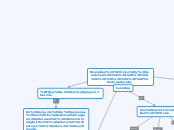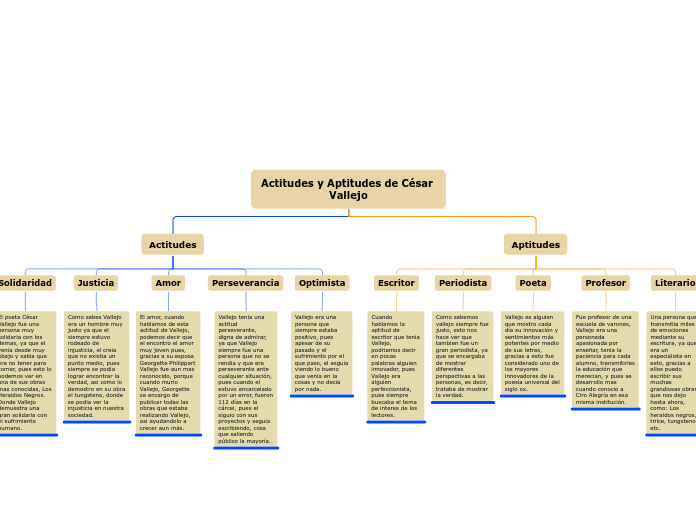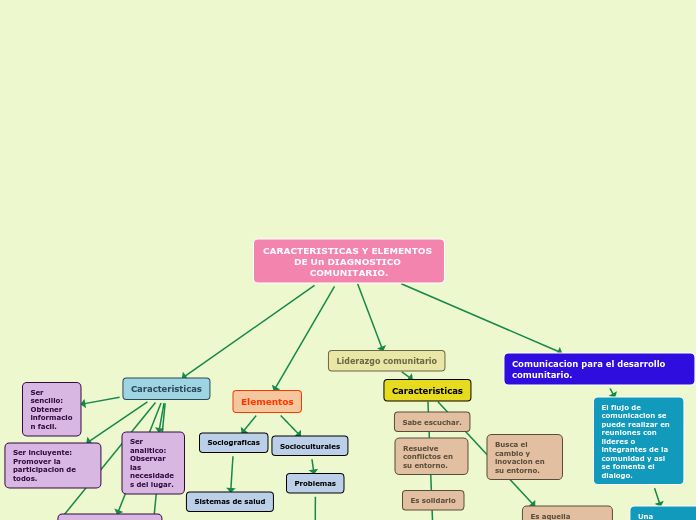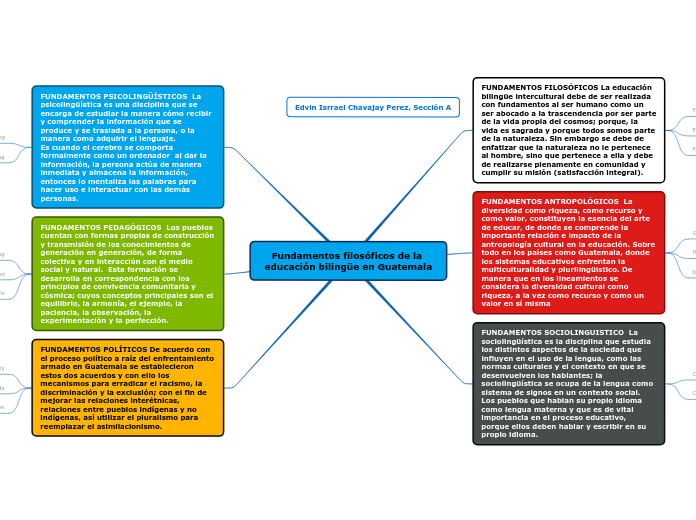Las TICs en la educación
The part of speech is a category to which a word is assigned according to its syntactic functions. In English the main parts of speech are noun, pronoun, adjective, determiner, verb, adverb, preposition, conjunction, and interjection.
Se establecen las siguientes etapas que se sugieren cuando se utiliza el Internet.
La etapa de creación
La etapa de apropiación
Corresponde a funciones complejas de asimilación, análisis y síntesis de la información.
Las etapas de adaptación
Hacen hincapié en la forma de concebir e interpretar la información encontrada, en otras palabras, es precisar la congruencia y pertinencia de dicha información con mi objetivo establecido.
El inicio
Involucra establecer objetivos específicos en la búsqueda y selección de información, ya que muchas veces suele ocurrir que nos “perdemos” en la vasta información que encontramos de un tema, es pertinente fijar los criterios para considerar cuál o cuáles serán las páginas web que se utilizarán.
Los cambios que se deben considerar en la aplicación de las TIC en la educación.
Contenidos didácticos
Los nuevos contenidos con el uso de las TIC se hacen más dinámicos, interactivos, creativos y motivadores para los educandos, existe una variedad de contenidos que facilitan el proceso de enseñanza y aprendizaje.
Formas pedagógicas
Inmerso en los cambios educativos, sin lugar a duda, no podemos dejar por fuera el rol del docente y del alumno(a), aunque se suele pensar y resulta ser un debate que la tecnología desplaza la labor docente, esta idea se está superando, ya que la utilización de las TIC en el aprendizaje depende en gran medida de la creatividad, disponibilidad, actitud y formación pedagógica del docente.
Centros escolares
Subordinating conjunctions are conjunctions that are used at the beginning of subordinate clauses. Some examples of these conjunctions are: although, after, before, because, how, if, once, since, so that, until, unless, when etc.
En definitiva si cambia los objetivos de la educación, debemos cambiar la infraestructura, y los espacios educativos.
Objetivos
A conjunction is a word like 'if' 'but' or 'and' which is used to connect sentences or clauses together.
Se sugiere un cambio de objetivos en la educación, ya que los educadores deben preparar a los estudiantes en la Sociedad de la Información y Sociedad del Conocimiento.
Las TICs en el ámbito pedagógico:
Las nuevas tecnologías han tomado mucho protagonismo en nuestras sociedades, pero cada día más en la educación. Algunos autores como Seymour Papert o David Cavello opinan que las TIC son una oportunidad y a la vez una excusa para hacer verdades transformaciones en la práctica educativa.
Coordinating conjunctions always connect phrases, words, and clauses. They are: for, and, nor, but, or, yet, so.
Características importantes de las TIC:
An article is a word used to modify a noun, which is a person, place, object, or idea. Technically, an article is an adjective, which is any word that modifies a noun.
Innovación
Las TIC nos han cautivado por su enorme creatividad que captura nuestros sentidos y deja aún lado las formas convencionales de comunicarnos.
La interactividad
Hace referencia a la inmediatez para responder y enviar mensajes, podemos decidir la secuencia, cantidad y profundización de la información.
Diversidad,
Se trata de visualizar a las TIC,s en un sentido unitario, es decir, con una sola utilidad, o con muchas funciones.
La digitalización
Es una característica esencial porque nos establece la relación y cambio que ha tenido
La instantaneidad
Se refiere a lo oportuno y rápido que llega la información a destinos lejanos.
Inmaterialidad
It refers directly to a specific noun or groups of nouns.
Nos enfocamos a que se generan, procesan y acceden a grandes cantidades de información, asimismo que se presentan al usuario, códigos lingüísticos diferentes.
Belloch propone una clasificación de herramientas y tipo de comunicación:
A verb is an action word or 'doing' word that signifies movement in some way.
Acceso a recursos
Interrogative pronouns are used in questions. Although they are classified as pronouns, it is not easy to see how they replace nouns. Who, which, what, where, and how are all interrogative pronouns.
Obtención y/o utilización de información o recursos:
El Word Wide Web, con la triple “W” (WWW) podemos acceder a un sin número de páginas web, ubicadas en servidores de todo el mundo, las cuales están conectadas mediante el Internet.
Comunicación sincrónica
Es la comunicación que se establece en términos reales:
Audio-conferencia-Videoconferencia: que son muy comunes hoy en día en las universidades, y que son realizadas por una persona especializada en algún tema, y otro grupo de interlocutores situados en otras partes del mundo pueden visualizar y escuchar
Charlas: se establecen entre dos o más personas un tiempo real, y las personas pueden estar en distintas partes del mundo.
Comunicación asíncrona,
Indefinite articles are the words 'a' and 'an.' Each of these articles is used to refer to a noun, but the noun being referred to is not a specific person, place, object, or idea. It can be any noun from a group of nouns.
Es decir, el tipo de comunicación que no se establece en tiempo real, por ejemplo:
Unlike demonstrative pronouns, which point out specific items, indefinite pronouns are used for non-specific things. This is the largest group of pronouns. All, some, any, several, anyone, nobody, each, both, few, either, none, one, and no one are the most common.
Los grupos de noticias: o foros de debate (News groups): son todas aquellas noticias o temas de debates donde se puede participar dejando un comentario.
Listas de distribución: establece la relación de comunidades virtuales que comparten intereses comunes y se comunican enviando y recibiendo información a la dirección electrónica de la lista, todo esto se realiza mediante el correo electrónico.
Relative pronouns are used to add more information to a sentence. Which, that, who (including whom and whose), and where are all relative pronouns.
Correo electrónico: es el que nos permite enviar y recibir información personalizada, intercambiar mensajes con otros usuarios los cuales están conectados a Internet.
Qué es el Internet
La Real Academia Española la define de la siguiente manera:
A verb with its own meaning: a verb that is not an auxiliary verb.
Red informática mundial, descentralizada, formada por la conexión directa entre computadoras mediante un protocolo especial de comunicación
A linking verb connects the subject with a word that gives information about the subject, such as a condition or relationship.
Existen variados instrumentos electrónicos que se insertan dentro de la definición de TIC
Demonstrative pronouns are used to demonstrate (or indicate). This, that, these, and those are all demonstrative pronouns.
La computadora
Pero sin lugar a duda, el instrumento que más se utiliza es la computadora la cual nos facilita utilizar diferentes aplicaciones informáticas
Reciprocal pronouns are used for actions or feelings that are reciprocated. The reciprocal pronouns are each other and one another.
Y más específicamente las redes de comunicación como lo es el Internet.
A pronoun is a word that can be used in place of a noun, typically after the noun itself has already been stated.
Diseños y mas
Aplicaciones multimedia
Presentaciones
Programas
El video
El teléfono celular
La televisión
Topic principal
La evolución de las tecnologías de la información y la comunicación (Adell, 1997)
An adjective is a word that's used to describe a specific noun and to provide more detail to the listener.
Estos aparatos electrónicos han tenido su dinámica entre emisor-mensaje-receptor, Hoy en día la consideramos “obsoleta”
Possessive pronouns are used to show possession. The possessive pronouns are mine, yours, his, hers, ours, and theirs.
El teléfono, la radio, la televisión, el fax.
Revoluciones que han y están marcando nuestra historia
A noun which refers to a group of things/people.
evoluciones que han y están marcando nuestra historia
historia
Medios Electrónicos y la digitación
Superlative adjectives demonstrate a higher level of comparison between entities.
Nos referimos a esta revolución donde necesitamos aparatos para producir y descifrar códigos más abstractos y artificiales; para ilustrar esto, debemos mencionar su origen, el cual comienza con el invento de Samuel Morse, el telégrafo, creado en 1844.
A reflexive pronoun ends with ...self or ...selves and refers to another noun or pronoun in the sentence (usually the subject of the sentence). The reflexive pronouns are myself, yourself, herself, himself, itself, ourselves, yourselves, and themselves.
La Imprenta
Compound nouns are words where two nouns have been stuck together to make a new noun. Compound nouns should be written as one word, without a hyphen.
Aunque hay autores que señalan que la aparición de la imprenta corresponde a la fase anterior, ya que el código de información es el mismo, es decir, es igual la escritura manual que la escritura reproducida en una imprenta. Sin embargo el hecho de reproducir a gran escala, libros, panfletos, carteles, etcétera, ha permitido transformaciones políticas, sociales, económicas que han moldeado la modernidad tal como es ahora.
Signos Gráficos
The personal pronouns are I, you, he, she, it, we, they. More often than not (but certainly not always), they replace nouns representing people.
El habla creó la presión evolutiva de los seres humanos en comunicarnos de otra forma, en este caso la escritura. La escritura en cierta medida despersonalizó y logró objetivar el conocimiento, de manera contraria que pasa con el habla.
El Lenguaje Oral
Countable nouns are nouns that can be counted, even if the number might be extraordinarily high.
Uncountable nouns are nouns that come in a state or quantity which is impossible to count; liquids are uncountable, as are things which act
like liquids.
Entendida ésta como la codificación del pensamiento mediante sonidos producidos por las cuerdas bucales y la laringe (buco-articulación) es sin duda un hecho revolucionario. El habla proporcionó una nueva forma de comunicación o interacción entre humanidad.
Desde hace mucho tiempo, han existido autores que han divido la historia de la humanidad en fases o períodos de acuerdo a la tecnología dominante de codificación, almacenamiento, recuperación de la información, así como la producción y reproducción de dicha información.
Expresses a comparison between two entities or groups of entities in quality or degree.
El surgimiento de la sociedad de la información:
A noun is defined as a person, place, thing or idea. Proper nouns always begin with a capital letter. Common nouns, which are general words, such as 'cars,' are not capitalized.
El cual es un conjunto de transformaciones económicas, sociales y culturales que están cambiando la base material de nuestra sociedad. Es ello quizás uno de los fenómenos más espectaculares asociados a este conjunto de transformaciones, en dichos cambios ésta explícita la introducción generalizada de las nuevas tecnologías de la información y la comunicación en todos los ámbitos de nuestras vidas.
Proper nouns are the names of specific people or places. They should always begin with a capital letter.
cambiando nuestra manera de hacer nuestras actividades:
aprender
relacionarnos
divertirnos
trabajar
Qué son las TIC:
El estudio, diseño, desarrollo, implementación, soporte o dirección de los sistemas de información computarizados, en particular de software de aplicación y hardware de computadoras
En líneas generales podríamos decir que las nuevas tecnologías de la información y comunicación TIC son las que giran en torno a tres medios básicos: la informática, la microelectrónica y las telecomunicaciones; pero giran, no sólo de forma aislada, sino lo que es más significativo de manera interactiva e inter conexionadas, lo que permite conseguir nuevas realidades comunicativas
Las nuevas tecnologías de la información y la comunicación (ordenadores, equipos multimedia, redes locales, Internet, T.V. digital...) que podríamos definir de forma operativa como sistemas y recursos para la elaboración, almacenamiento y difusión digitalizada de información
